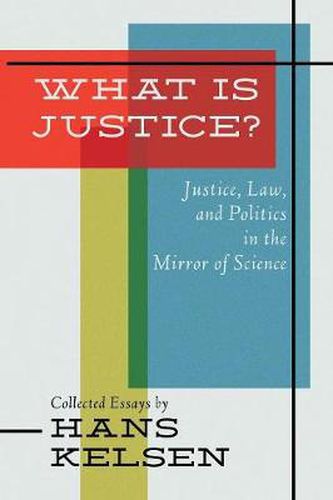Readings Newsletter
Become a Readings Member to make your shopping experience even easier.
Sign in or sign up for free!
You’re not far away from qualifying for FREE standard shipping within Australia
You’ve qualified for FREE standard shipping within Australia
The cart is loading…






This title is printed to order. This book may have been self-published. If so, we cannot guarantee the quality of the content. In the main most books will have gone through the editing process however some may not. We therefore suggest that you be aware of this before ordering this book. If in doubt check either the author or publisher’s details as we are unable to accept any returns unless they are faulty. Please contact us if you have any questions.
Originally published: Berkeley: University of California Press, 1957. [vi], 397 pp. Through the lens of science, Hans Kelsen proposes a dynamic theory of natural law, examines Platonic and Aristotelian doctrines of justice and the idea of justice as found in the holy scriptures. You simply cannot get around this book if you want a real understanding of the fundamental ideas on which the great work of Kelsen is built. Reading this volume you may once more admire the transparent clarity of style and the merciless consistency of reasoning which are well known qualities of this author. – Alf Ross, 45 California Law Review 564 1957. Possibly the most influential jurisprudent of the twentieth century, Hans Kelsen [1881-1973] was legal adviser to Austria’s last emperor and its first republican government, the founder and permanent advisor of the Supreme Constitutional Court of Austria, and the author of Austria’s Constitution, which was enacted in 1920, abolished during the Anschluss, and restored in 1945. He was the author of more than forty books on law and legal philosophy. Active as a teacher in Europe and the United States, he was Dean of the Law Faculty of the University of Vienna and taught at the universities of Cologne and Prague, the Institute of International Studies in Geneva, Harvard, Wellesley, the University of California at Berkeley, and the Naval War College.
$9.00 standard shipping within Australia
FREE standard shipping within Australia for orders over $100.00
Express & International shipping calculated at checkout
Stock availability can be subject to change without notice. We recommend calling the shop or contacting our online team to check availability of low stock items. Please see our Shopping Online page for more details.
This title is printed to order. This book may have been self-published. If so, we cannot guarantee the quality of the content. In the main most books will have gone through the editing process however some may not. We therefore suggest that you be aware of this before ordering this book. If in doubt check either the author or publisher’s details as we are unable to accept any returns unless they are faulty. Please contact us if you have any questions.
Originally published: Berkeley: University of California Press, 1957. [vi], 397 pp. Through the lens of science, Hans Kelsen proposes a dynamic theory of natural law, examines Platonic and Aristotelian doctrines of justice and the idea of justice as found in the holy scriptures. You simply cannot get around this book if you want a real understanding of the fundamental ideas on which the great work of Kelsen is built. Reading this volume you may once more admire the transparent clarity of style and the merciless consistency of reasoning which are well known qualities of this author. – Alf Ross, 45 California Law Review 564 1957. Possibly the most influential jurisprudent of the twentieth century, Hans Kelsen [1881-1973] was legal adviser to Austria’s last emperor and its first republican government, the founder and permanent advisor of the Supreme Constitutional Court of Austria, and the author of Austria’s Constitution, which was enacted in 1920, abolished during the Anschluss, and restored in 1945. He was the author of more than forty books on law and legal philosophy. Active as a teacher in Europe and the United States, he was Dean of the Law Faculty of the University of Vienna and taught at the universities of Cologne and Prague, the Institute of International Studies in Geneva, Harvard, Wellesley, the University of California at Berkeley, and the Naval War College.